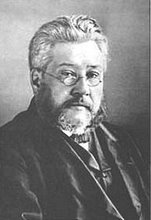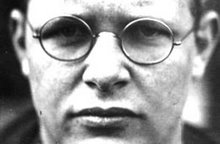God Has No Grandchildren
 “In 1904 the country of Wales experienced a remarkable revival. Thousands of people were introduced to Christ, and the results were dramatic. Bars closed because of a lack of business. Policemen exchanged their weapons for white gloves as crime disappeared. Horses did not understand their drivers because profanities were no longer uttered. Wales sent missionaries all over the world.
“In 1904 the country of Wales experienced a remarkable revival. Thousands of people were introduced to Christ, and the results were dramatic. Bars closed because of a lack of business. Policemen exchanged their weapons for white gloves as crime disappeared. Horses did not understand their drivers because profanities were no longer uttered. Wales sent missionaries all over the world.
One of those missionaries traveled to Argentina, where on the streets, he led a young boy to Christ. The boy’s name was Luis Palau. He has since become known as the ‘Billy Graham’ of Latin America. Out of gratitude for this Welsh missionary, Palau traveled to Wales during the early 1970s to express his thankfulness to that nation for helping lead him to Christ. What he discovered was astonishing. Less than one half of one percent of the Welsh attended church. Divorce was at an all-time high, and the crime rate was escalating rapidly. Many churches had closed and been converted to bars, and rugy had replaced Christianity as the national religion.
As a result of this experience, Palau produced a film entitled God Has No Grandchildren. The thrust of the film is that each generation is responsible for passing on the faith to the next.”
Source: Your Money Counts – Howard Dayton, p.118 Pic above: Welsh Revival preacher Evan Roberts. Click this link.
Pic above: Welsh Revival preacher Evan Roberts. Click this link.
Pic right: June 2005, Luis Palau in Madrid for a crowd of 70,000 people (3,500 of them made a decision for Christ.)





.jpg)



























10 comments:
I came to Christ through a Palau meeting at QPR in London.
Those thoughts are exactly correct. Revival generations generally have not done the best job at passing on their faith. why do you think that is?
Good question, Mike! The author of the book that I am quoting says that we just do a lousy job (my words) in passing on the baton to the next generation. We just 'assume' that they will also follow Christ.
I discussed this with Lydia (my wife) and she says that maybe converted people are too radical and they are so consumed by their new found faith that they don't make enough of an effort to reach their own children for Christ; or maybe they even don't pay enough attention to their families because they are too busy working for the church... She could be right (she often is).
My two cents: we are in the middle of a spiritual war and the enemy is not amused when he loses territory to the Kingdom and he will stop at nothing to reclaim it (remember our discussion about Glastonbury?) But: he is a liar from the beginning and a loser in the end - as the example of Palau clearly shows! The work of God's Spirit is never in vain and will continue anyway.
Great to find out that you came to Christ through a Palau meeting. I would like to hear more about that!
One more thing, Mike. I published the Dutch edition of Tony Lambert's book China's Christian Millions. That's nice - but is there a connection with revival in Wales? I don't know, but there might be!
Christianity almost disappeared in some parts of China - but the seeds of the Gospel have been planted and (sometime decades after the missionaries died) - you can see the harvest. Not hundreds, not thousands, but - indeed - MILLIONS of Christians are now living in China. Check out this information for example (taken from the OMF website):
Nestorian Christians entered China as early as 505AD, though oral traditions have it that the Apostle Thomas visited China before he was martyred and buried in India. During the Tang Dynasty, the Nestorian bishop Alopen arrived in China. His teaching was found by the Chinese emperor to be "helpful to all creatures and beneficial to all men" and was allowed to be preached throughout the country. However, many of the Nestorian church leaders were of Turkic ethnicity which later worked against the Nestorians leaving a lasting imprint on China.
Circa 1275, Kublai Khan sent letters via the Polo brothers to the Pope in Rome asking for 100 teachers of science and religion, "wise in the Christian law and acquainted with the seven arts." Few answered the call and even fewer even attempted the journey. Shortly before Kublai Khan died, the first Roman Catholic missionary, a lone Franciscan monk, arrived in China in 1294. Less than 100 years later, under the Ming emperors, Christianity again almost disappeared from China.
Not much else is heard about the church in China until Matteo Ricci of the Society of Jesus (Jesuit) arrived in China in 1583. He focused on reaching the nobility and scholars of China. His influence was so respected that at his death the emperor made him an honorary citizen of China. By his death, there were 400 converts. Within fifty years, there were 150,000.
The first Protestant missionary to China, Robert Morrison of the London Missionary Society, arrived in 1807. Previously, portions of the Bible had been translated into Chinese, but Morrison begana to systematically translate and publish the scriptures into Chinese. In 1842 the Treaty of Nanjing ended the first Opium War and opened China up to foreign interests including missionary activity. This began China's open century. By 1869 there were more than 400 missionaries in China from 30 different denominations. In 1926 there were more than 8,000 missionaries residing in China. China's open century ended abruptly on October 1, 1949 when the communists came to power. By the time the last foreign missionary was expelled in 1953, there were more than 750,000 Chinese Protestants across the nation.
Since that time, China has experienced one of the greatest revivals in church history, with some eastern provinces experiencing continual growth for more than 30 years. Operation World 2001 estimates that 7% of the population practices Christianity. Yet persecution exists and is fierce in parts of China. Several translations of the Bible exist today including the Union translation and the New Chinese Version. The Jesus film, gospel recordings and Christian broadcasting are available in Mandarin. Despite these great developments, hundreds of millions of Han Chinese have yet to hear the gospel.
Very true, Paul. I've heard it said that Christianity is only one generation from extinction.
@ Art - I hope Jesus was only kidding whe He asked, "However, when the Son of Man comes, will he find faith on the earth?" (Luke 18:8)
Of course this was a serious question, but our Master also said to his disciples: "I tell you, open your eyes and look at the fields! They are ripe for harvest." (Luke 4:34)
Looking from an American or European perspective, we have many reasons to be worried about the future of the church (although I also see many positive signs here). But looking from an African, Asian or South American point of view - the future's so bright that we got to wear shades!
I really don't believe that the church will go down - Jesus gave Peter this assurance: "...on this rock I will build my church, and the gates of Hades will not overcome it." I trust Jesus had a better picture of the future than all of today's "prophets"!
And what about John's vision in the book of Revelation: " After this I looked and there before me was a great multitude that no one could count, from every nation, tribe, people and language, standing before the throne and in front of the Lamb. They were wearing white robes and were holding palm branches in their hands." Let's be optimistic, my friend - there will be a huge harvest.
Paul,
I think your wife might be right. Those of us who come from non Christian families tend to be a bit more radical. We are so excited about our redemption that we become a little off balance. Interesting thought.
Great discussion guys! I really like listening to Luis Palau. Would be great to hear him in person.
I wonder too, if much of the compacancy of this generation is due to the reliance on the church rather than the reliance on the Church. I have been part of many denominations over the years due to moves and God's leading. Great things in all that I attended, but so much focus on the man made programs, theology... that God often is left out or second place and His word is taken out of context to fit the latest book, curriculum, study or point of the sermon.
I don't believe all is lost, I do agree that there is a great spiritual battle going on and I personally believe there will be a great revival in the near future. In the meantime, meeting people and building a relationship in our daily lives, one at a time, will bring others to a desire to have that personal relationship with Jesus Christ.
I'm grateful for the Billy Graham's and the Luis Palau's of the world. They are doing a great service for the kingdom. Equally important are those of us willing to be the "hands, feet, ears, heart..." of God when those individuals who come to know the Lord because of what they hear in crusade meetings... we all need to have that daily reality support when we join the family of believers.
I have heard that so many make decisions for the Lord and then either fall away or never grow because they do not have the fellowship/accountability after the decision. That's where we can be such an intrigal part of the growth of the Church.
We need to start in our own homes, in our neighborhoods, work place... by the consistency of our relationship and walk with our Lord. If we all made a difference to even one other, then exponentially the multitudes, all over the world, would be reached.
I think the American church is in pretty good shape. While some denominations descend into irrelevancy, new ones surge forward. It all depends on what your idea of "the church" is. If it's monolithic, and you want to see a return to a single power like Rome, American religion is a mess. If you think of God's church as a mosaic, it's in great shape.
There's also the rise in Christian broadcasting, which was essentially unheard of when I was a child.
My personal experience tells me that Lydia is right. You can neglect your kids' spiritual formation for good reasons as well as shallow ones. And taking them to church isn't enough--they have to have a community of likeminded kids, know the Word, and see real witness in the adults around them. And since they're living in a very fallen world, they also need prayer, prayer, prayer.
As the old man walked along the beach at dawn,
he could see someone far down the beach flinging something into the ocean,
Time and again,
the person would bend over, pick up something, stand up,
and throw it into the water.
Finally the old man caught up to the young man,
and asked him why he was doing this.
The young man replied that the stranded starfish would die if left in the morning sun.
"But the beach goes on for miles, and there are millions of Starfish."
retorted the old man. "How can you really make a difference?"
The young man looked at the starfish in his hand
and then he threw it into the safety of the waves as he replied
"It makes a difference to this one."
(The Starthrower, by Loren Eisley)
Francis Collins, the geneticist whose The Language of God I am currently reading, describes a trip he made as a relief worker in Africa in the chapter "Truth Seekers." As a western doctor, he knew there were limitations to what he was going to be able to accomplish. The health care system was not going to be the same as in the developed world. Still, he imagined he was going to do great things, maybe save all kinds of people.
The reality was more brutal, and he found himself worn out by the apparent hopelessness of the situation. "I grew more and more discouraged," he wrote, "wondering why I had ever thought that this trip would be a good thing."
Then one day, a farmer came in near death. He recognized the symptoms right away of something called a "paradoxical pulse", probably brought on by tuberculosis. He knew that the only treatment available was something a cardio specialist would normally do. Collins wasn't qualified for the procedure. But it was the only way to save him. So using a large needle, he bore a hole in the man's chest, drew out the fluid, and the man's symptoms subsided.
The next day, the young farmer told him, "I get the sense you are wondering why you came here. I have an answer for you. You came here for one reason. You came here for me." (You can hear Collins tell this story in his own words here.)
Collins learned what so few of us do. We are all called to do great things. But the great things we are meant to do are not necessarily things that will change the world, dramatically altering the flow of history. Maybe the great thing we are meant to do will only save one person; maybe the great thing we will do will be known only to God - maybe we won't even be privileged to know what it is, or when it happened. But live every moment like it is your great thing, your vocation. Every moment you face may be the one reason you were put on this Earth.
So live every second like it is the one thing you are here to do. For who knows? Maybe it is.
That is beautiful, Lane - thanks. When we look at all the things that must be done to bring some light in the darkness - all the suffering, all the loneliness, all the big and small tragedies - we feel so powerless. But let's faithfully do what we can do and God will use our little efforts to make a big difference. Thank you for your contribution.
Post a Comment